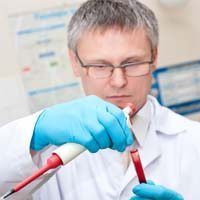In Search of a Diagnostic Blood Test for Mesothelioma
 Doctors in Turkey believe they may be a step closer to developing a more sensitive blood test that could improve the odds of surviving mesothelioma by allowing it to be identified earlier.
Doctors in Turkey believe they may be a step closer to developing a more sensitive blood test that could improve the odds of surviving mesothelioma by allowing it to be identified earlier.
While it’s extremely rare and usually only diagnosed in people who have been exposed to asbestos, malignant pleural mesothelioma is also one of the most universally lethal cancers.
One reason for the high death rate among mesothelioma patients is that the disease often causes no symptoms until it is in its advanced stages, when treatments like chemotherapy and radiation are less likely to work.
But a team of doctors in Diyarbakir, Turkey claim to have identified two of the most important biomarkers in blood serum that could be red flags for early mesothelioma diagnosis.
Biomarkers for Mesothelioma
Scientists from around the world have long been searching for the perfect biomarker or biomarkers that could indicate that a person definitely has malignant mesothelioma.
So far, no single biomarker has been found to be definitive for mesothelioma diagnosis, though several have been shown to be elevated in people with mesothelioma.
The Turkish researchers used these previously-tested biomarkers as their starting point. Their study included serum level tests for soluble mesothelin-related peptide (SMRP), thioredoxin-1 (TRX), epidermal growth factor receptor (EGFR), fibulin-3, syndecan-1 (SDC-1) and mesothelin.
Testing Mesothelioma Biomarkers
To determine which biomarkers were most valuable for diagnosing mesothelioma as early as possible, the team divided study participants into three groups: healthy individuals, people who had been exposed to asbestos but were not known to have mesothelioma, and mesothelioma patients.
Each participant was tested to determine their level of each of the six biomarkers. When the results were evaluated, there were two clear mesothelioma biomarker winners.
“SMRP and TRX increased in a graded fashion from the controls to asbestos exposure and malignant pleural mesothelioma groups,” writes lead author Melike Demir, a member of the Dicle University Faculty of Medicine in Diyarbakir. “These two seem to be the most valuable biomarkers for the diagnosis of malignant pleural mesothelioma, both individually and in combination.”
What Does This Mean for Mesothelioma Diagnosis?
The MESOMARK assay, the most well-known blood test for mesothelioma, is already being used to test suspected mesothelioma patients for levels of SMRP (though not TRW), but the test has to be used in conjunction with other diagnostic tools like imaging studies and tissue biopsies.
Other scientists elsewhere in the world are also continuing to look for and test potential mesothelioma biomarkers.
Until a definitive mesothelioma blood test is available, people who have been exposed to asbestos should be aware of the symptoms of mesothelioma and should visit their doctors regularly. As with most cancers, mesothelioma is most responsive to treatment in its earliest stages.
Source:
Demir, M, et al, “Evaluation of New Biomarkers in the Prediction of Malignant Mesothelioma in Subjects with Environmental Asbestos Exposure”, March 31, 2016, Lung, Epub ahead of print, http://link.springer.com/article/10.1007/s00408-016-9868-1





